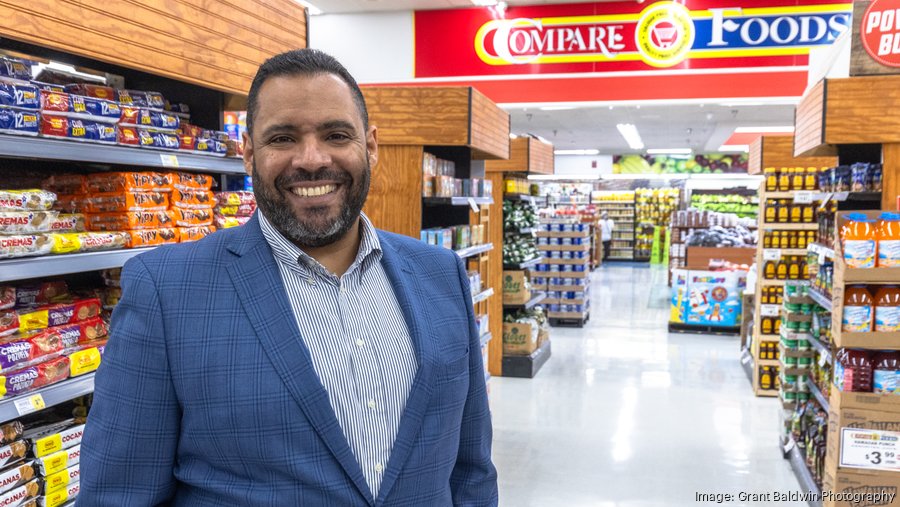
Latinos Mean Business: Compare Foods
- CBJ | By Laura Williams-Tracy
Food from our upbringing carries a powerful emotional meaning, and sharing food across cultures brings people together.
Those strong cultural connections are a welcomed byproduct of the work of Omar Jorge and his expansive family network who run Compare Foods. Jorge grew up in the grocery business in New York City and now bringing fresh meats and produce as well as harder-to-find Latin foods to a growing clientele in Charlotte.
“If there’s something that I would call our core mission, it’s the cultural connection we make with customers,” says Jorge, chairman of Aurora Grocery Group and the owner of four Compare Foods locations in Charlotte. “It’s what we tell our employees. We don’t want customers to just come to buy food. We want them to have a cultural experience in the city of Charlotte.”
A grocer by training and a lawyer by education, Jorge runs his stores and oversees an organizing entity that coordinates the back-office operations, vendor contracts and marketing for 27 locations of Compare Foods and 11 Gala Fresh Farms locations in the Northeast.
How did Compare Foods begin?
Both of my parents were born in the Dominican Republic. I was born in New York but I lived in the Dominican Republic when I was younger. My mother’s side of the family became involved in corner bodegas in New York City in the 1970s. These were convenience stores, basically. In the 1980s, a lot of my family began leasing out empty spaces that were previously grocery stores that left because of the neighborhood’s changing demographics. They ended up being very successful. They were able to rebrand the stores based on the communities that surrounded them. That’s how Compare Foods began. We opened our first Compare Foods in 1989 on Long Island.
What was your career path to the grocery business?
I grew up in supermarket industry. I spent every weekend with my mom and dad in the stores. By the time I was 14, I was in the office with a paycheck. Since I was in high school, I wanted to be an attorney. I went off to college and was able to go to law school, pass the bar and begin to practice. I spent about seven years out of the supermarket focusing on my education. I practiced for about a year and a half. In 2009, my father called me to tell me he had the opportunity to buy my uncle’s stores in Charlotte. He asked if I wanted to come to Charlotte to run the stores. As a family member, I thought maybe this was what my destiny should be. I came with my wife and two kids to the store on East Arrowwood Road. In 2011, we opened a second store on Nations Ford Road. That store has been very successful. My uncle had the first Compare Foods in Charlotte at N. Tryon and Sugar Creek. He retired in 2018. We consolidated ownership and our family now has seven stores in Charlotte. I own four. My aunt owns one on Milton Road and one on Sunset Road and my cousin owns one on Freedom Drive. It is still a family business.
How has the business grown?
Now, we have 27 stores in North Carolina. Some are family-owned and some we license the name to other operators that are former employees or managers who learned how to run a supermarket and now have their own business. We give them a license to be able to piggy-back on our economies of scale while they run their own store.
How many family members are in the business?
Oh, boy. On my mother’s side of the family there are 15 brothers and sisters. At last count, there were 66 cousins, which are my generation. In the generation younger than mine, they’re in their 30s already. The vast majority of my family are all involved in the supermarket business.
There has been a significant change in Hispanic representation since I arrived in Charlotte in 2009. There’s obviously the group here before me that are the nucleus of Hispanic civic leadership. It is empowering and inspiring to see every year that there are new Hispanic business owners who arrive and add to the community. It’s important to see how visible we are and how much economic activity there is going through Hispanic businesses.
Tell me about your growth.
The market demographics are in our favor. When you look at the growth rate of traditional grocery stores compared with ethnic stores – and not just Latin grocery stores, Asian stores are doing really well – the growth of ethnic food stores is far outpacing traditional grocery stores. The main driver is immigrants who go to stores looking for products that remind them of their grandmother’s cooking. At the same time, the traditional American customer is becoming more curious about new food. There’s an increased cultural awareness, either because consumers are traveling more or watching The Food Network. We do get a lot of foodies who are culturally aware customers who are looking for ingredients.
We hear a lot about grocery wars between Walmart, Target and others. Are you part of that intense competition?
We focus on our strengths, such as our international selection. We carry products other grocery stores just don’t have. The other focus is our perishables, our meats and produce. At the store where I am, we have 11 butchers in-house cutting meat all day. So, it’s fresher than at many mass market grocery stores. Our customers appreciate that. If we get in a pricing war with Walmart, we will lose. That’s not a viable strategy.
Are Hispanic businesses more visible in Charlotte?
There has been a significant change in Hispanic representation since I arrived in Charlotte in 2009. There’s obviously the group here before me that are the nucleus of Hispanic civic leadership. It is empowering and inspiring to see every year that there are new Hispanic business owners who arrive and add to the community. It’s important to see how visible we are and how much economic activity there is going through Hispanic businesses.
Do you use your law degree in the grocery business?
I don’t think Aurora would exist if it wasn’t for my law degree. I would not have had an idea of how to structure something that would work. I did transactional work as an attorney, and with the grocery business, commercial real estate is a huge part of the business. It has been tremendously helpful. I use my law degree every day.
How has Bank of America helped your business?
The role of Bank of America plays as a primary company in Charlotte can’t be understated. They have been a tremendous asset for the Hispanic-Latino community in Charlotte. They have exhibited support and leadership within the Hispanic community. Their commitment to diversity and cultural experiences and support of Hispanic entrepreneurs in the region is to be commended. There are a lot of Hispanic-Latino leaders at Bank of America who take civic leadership seriously.
What challenges have you faced?
The anti-immigrant sentiment is always something I feel we need to overcome. It never fully goes away. It’s that fear that we have new people arriving in the neighborhood and sometimes instead of welcoming them, we push them away. And people who call themselves leaders encourage that to fuel their own ambitions. That filters to the business community. The more you have politicians trying to divide us based on ethnicity or culture, the more it weakens us as a community. That is a challenge that comes up over and over again.
What is it about the business makes you proud?
The cultural connection we make with our customers. A very close second would be seeing the development of our employees. We’ve seen people start out as a bagger and move up to store manager. It’s the journey of improvement and learning and moving up, that changes lives in a direct way. My family did that for us, and it’s the same obligation we have to be able to do that for our employees.
